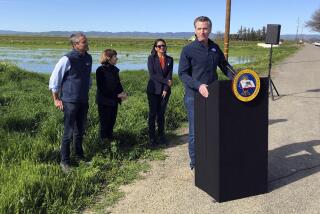1990 in Ventura County : YEAR IN REVIEW : The Drought : Down to the Last Drops
As the statewide drought entered its fifth year, its impact in the county spread from a few cities to virtually every farm and community.
Ventura, which has perhaps the most severe shortage in the county, passed a mandatory conservation ordinance in May that required major institutions to reduce use by 20%, smaller businesses by 15%. Single-family residences were limited to 294 gallons a day and units in multifamily dwellings to 196 gallons.
Compliance has been good, but the drought is still crippling the city.
Some companies have threatened to leave. Ventura High School closed its leaking swimming pool.
Restrooms and showers at San Buenaventura State Beach have been shut off on weekdays.
At one point, the city talked about towing in icebergs from polar regions. Enthusiasm for that idea quickly melted, but Ventura still is considering building a seawater desalination plant. In the fall, Ventura commissioned a study on the environmental impact of building an $85-million pipeline to hook into the state water system at Lake Castaic. But the state system is hurting, too.
In December, the Metropolitan Water District, which imports water from the Colorado River and Northern California, imposed restrictions on its customers, including Simi Valley, Thousand Oaks, Moorpark, Camarillo and Oxnard.
Hardest hit were farmers, who were ordered to reduce consumption by 20%.
Looking Ahead
In Ventura and the Ojai Valley, local rainfall will determine how soon the drought ends.
In the eastern part of the county, the key factor is how much rain and snow falls in Northern California.
Without above-normal precipitation this winter, the state predicts that agriculture will be cut to 35% of normal supplies in 1991, while municipal and industrial customers get 85%.
If growers have to plant less, they won’t need to buy as much fuel or equipment.
Fewer jobs will be available for farm workers, perhaps resulting in an increase in welfare payments.
Produce will cost more.
More to Read
Sign up for Essential California
The most important California stories and recommendations in your inbox every morning.
You may occasionally receive promotional content from the Los Angeles Times.









